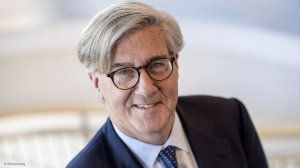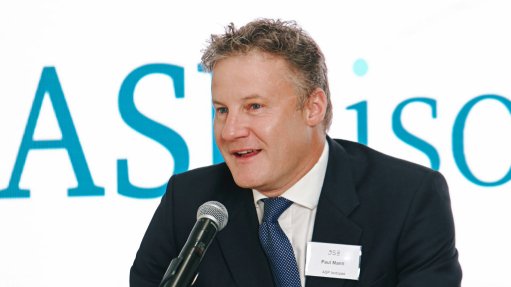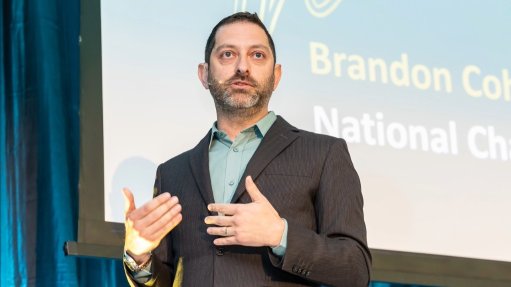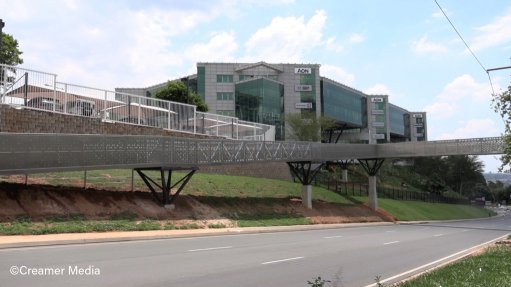Business model of Western mining industry needs new power, London Indaba highlights

Barrick's John Thornton at London Indaba covered by Mining Weekly's Martin Creamer. Video: Darlene Creamer.
New power is needed by the Western mining industry, which is still functioning on a trailing old power business model.
This was highlighted at the London Indaba, where a spotlight was shone on the urgent need of Western world mining companies to pay attention to the benefits that could emerge by working with far greater cognisance of the far-reaching strides that have been taken by the Eastern world.
While miners are mining and manufacturers are making things with metals and minerals, China in particular is beneficiating in-between in a way that brings very significant competitiveness.
A slide displayed by London Indaba chairperson and South African mining luminary Bernard Swanepoel showed China’s nigh-overwhelming contribution to the world’s clean-technology supply chain, for example.
Over the past two decades, China has transformed the macro environment for the global mining industry, Swanepoel noted in introducing John Thornton, an early mover in recognising the seismic shift that has resulted in China advancing very rapidly into the middle ground of adding value indispensably to mined products.
Besides being Barrick Gold Corporation non-executive chairperson and a director and professor of global leadership at the prestigious Tsinghua University in Beijing, where he has been seeking to develop deep partnerships, Thornton is also lead director of the Ford Motor Company, and the single most important reason for Ford being in China is to be able to see the future faster.
“In general, the Chinese companies are hungrier, more tolerant of failure, much faster and, most important, they are looking at the long-term success,” Thornton outlined at the event covered online by Engineering News & Mining Weekly.
As the discussion between Swanepoel and Thornton was billed as a fireside chat, Thornton drew attention to the fireside chat that former US President Franklin Roosevelt gave to save America from catastrophe during the financial crisis of 1933.
One sensed from this that Thornton is alerting the world to the need to treat the inability of the West, including the mining industry, to match the strong forward momentum of China’s advances as being a crisis that needs a Roosevelt approach to making this beneficial for the world as a whole, by way of Western-Eastern partnership.
“I go for this long story because I think a theme that we’re going to get to is the mining industry and mining companies and how they do or do not engage with the people as a whole,” said Thornton, who also placed major emphasis on the need for personal trust between Western and Eastern leaders as well as between mining company leaders and African leaders.
“Personal trust is, in a sense, the whole thing. If you can’t build the trust, you’re not going to have any success, and it has to be genuine trust,” he stated.
Swanepoel noted that China had done more than any other country to reduce dependence on nickel and cobalt.
“You can agree or disagree with the need for that but it is China’s moving away from high nickel and cobalt that has really moved the whole world’s supply chains into a much better position, he said, while displaying an infographic that illustrated the significant decline in the prices of batteries.
“This, if nothing else, is a clear megatrend and the cheaper batteries become, the higher their application should be throughout the world and certainly in battery electric vehicles, among other things.”
Swanepoel: What lessons do you think Western-based mining companies could learn from the way China has expanded its global investment and organic capability in the natural resources industry?
Thornton: My passion for more than two decades has been the rise of China and the relationship of the rise of China to the world in general and the US in particular. You can make a strong case that Africa is Ground Zero, the central point in an area of fast change and intense activity, for that US-China tension. As an American, when you get invited to participate in a fireside chat, like this one we’re having now, you think of Franklin Roosevelt, who was the US President from 1933 to 1945. My first degree was in American political history, specifically the Great Depression. So, I couldn’t help but think about Roosevelt, and I want to go through this a little bit because I think it’s relevant. Roosevelt took office in March of 1933 and eight days later, he gave his first fireside chat, on the banking crisis. Roosevelt had said to his staff he wanted a way to communicate directly with the American people and he wanted to do it as though he were sitting with a few friends around the fireside. The second or third day of the very first week he was President, he shut down all the banks in the country because too many were going under, there were runs on the banks and a loss of confidence in the banking system. Then, having shut down the banks, Roosevelt very quickly enacted legislation with the Congress to allow for Federal deposit insurance to calm down the fears of depositors. On a Sunday evening at 22:00, 60- million people listened to his first fireside chat, at a time when the population of the country was 120-million. Roosevelt very intentionally used simple language in describing complicated concepts.
Later on, when academics went back and looked, they found that 80% of words were among the most common words of the English language. On the day after the fireside chat, the banks began to reopen, half the money that had fled came back in, and the stock market had its best day in history up until that point. I go for this long story because I think a theme that we’re going to get to is the mining industry and mining companies and how they do or do not engage with the people as a whole.
I would recommend a book that came out five or six years ago called New Power, which contrasts old power and new power. Simplistically, old power is illustrated as operating like a currency that holders dole out as they see fit. New power is the directing of currency to a goal. That is also very relevant because it also gets to the question of the business model for the mining industry.
Now, regarding China, if you can imagine talking about China in the US, it is not good for your health. It’s a very, very toxic topic. In Washington, among the elites, China is seen as a competitor, enemy, opponent. From time to time, I am asked to speak to American audiences on China and it is always a dilemma for me, because I think to myself, you’re only going to get into trouble so where do you start. So, I think to myself, maybe an easier way to deal with the question is to look into the future and in that way take some of the emotion out of the present day, but soon enough it’s real.
So, I started focusing on mid-century, near 2050. I did some research and I learnt that the best estimates are there will be something like 10-billion people in the world in 2050 compared with the current global population of roughly eight-billion people. The two-billion incremental people are going to come primarily from nine countries, which include India, Pakistan, the Democratic Republic of Congo, Uganda, Indonesia, Ethiopia and Tanzania. Essentially, you are adding two-billion primarily poor people from mainly Africa and parts of central Asia.
At the same time, there will be a greater concentration of wealth and many more poor people. China and the US now represent 40% of global GDP and by 2050 that could be as high as 60%. We know the negative nature of disparity because we are living in it today and any topic you want to choose, whether it be climate change, pandemics, terrorism or any topic chosen, the dynamics around it worsen in the world envisaged in 2050.
Who thinks it’s a good idea in the world described that the top two countries should be spending most of their time fighting with each other. That can’t make any sense in any rational universe. I start with that context because when I took on the job as chairperson of Barrick, I went to the senior leaders of China and said since I left Goldman Sachs a decade ago, I have not taken one penny from one person for one thing because when I was teaching at Tsinghua University and also advising Chinese officials, I didn’t want there to be any doubt in their minds as to what I was doing and why I was doing it.
Article Enquiry
Email Article
Save Article
Feedback
To advertise email advertising@creamermedia.co.za or click here
Comments
Press Office
Announcements
What's On
Subscribe to improve your user experience...
Option 1 (equivalent of R125 a month):
Receive a weekly copy of Creamer Media's Engineering News & Mining Weekly magazine
(print copy for those in South Africa and e-magazine for those outside of South Africa)
Receive daily email newsletters
Access to full search results
Access archive of magazine back copies
Access to Projects in Progress
Access to ONE Research Report of your choice in PDF format
Option 2 (equivalent of R375 a month):
All benefits from Option 1
PLUS
Access to Creamer Media's Research Channel Africa for ALL Research Reports, in PDF format, on various industrial and mining sectors
including Electricity; Water; Energy Transition; Hydrogen; Roads, Rail and Ports; Coal; Gold; Platinum; Battery Metals; etc.
Already a subscriber?
Forgotten your password?
Receive weekly copy of Creamer Media's Engineering News & Mining Weekly magazine (print copy for those in South Africa and e-magazine for those outside of South Africa)
➕
Recieve daily email newsletters
➕
Access to full search results
➕
Access archive of magazine back copies
➕
Access to Projects in Progress
➕
Access to ONE Research Report of your choice in PDF format
RESEARCH CHANNEL AFRICA
R4500 (equivalent of R375 a month)
SUBSCRIBEAll benefits from Option 1
➕
Access to Creamer Media's Research Channel Africa for ALL Research Reports on various industrial and mining sectors, in PDF format, including on:
Electricity
➕
Water
➕
Energy Transition
➕
Hydrogen
➕
Roads, Rail and Ports
➕
Coal
➕
Gold
➕
Platinum
➕
Battery Metals
➕
etc.
Receive all benefits from Option 1 or Option 2 delivered to numerous people at your company
➕
Multiple User names and Passwords for simultaneous log-ins
➕
Intranet integration access to all in your organisation

















